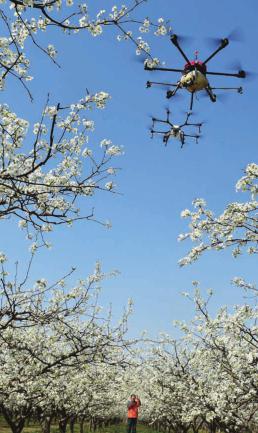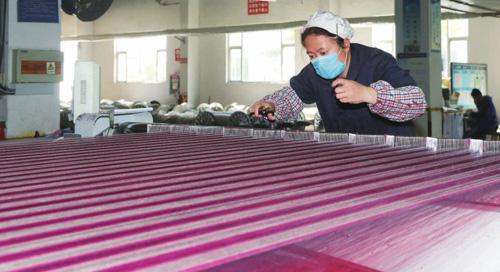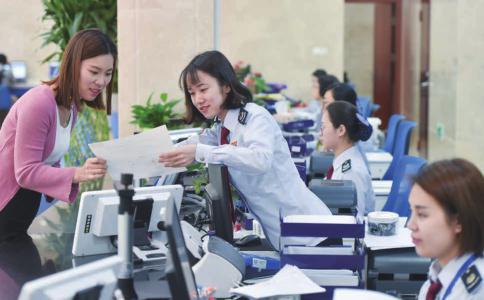Camel-Riding Holiday
2018-05-06

Tourists ride camels on their way to visit the Mingsha Mountain and Crescent Spring scenic zone in Dunhuang, northwest Chinas Gansu Province, on April 5. China had over 100 million domestic tourist trips during the three-day Qingming Festival holiday, up 8.3 percent from 2017, according to the Ministry of Culture and Tourism.
Xis Book Goes Online
E-books of the English and French editions of Chinese President Xi Jinpings book on poverty relief were offi cially released on April 9.
Xi, also General Secretary of the Communist Party of China Central Committee and Chairman of the Central Military Commission, was the Party chief of Ningde City in southeast Chinas Fujian Province from 1988 to 1990.
Titled Up and Out of Poverty, the book contains 29 of his speeches and articles, as well as photos from that period.
The Chinese edition was fi rst published in July 1992 and reprinted in August 2014, three years before the print versions of the foreign language editions were released.
Translated and published by the Foreign Languages Press, the foreign editions have drawn attention and praise from across the international community.
With content identical to that of the print versions, the e-books are available on major digital commerce platforms including Amazon, OverDrive, CNPeReading and iReader.
Household Services
Busy lifestyles and an aging population have boosted the household services market in China, but a survey published by the China Youth Daily on April 10 found that customers are not satisfi ed.
The survey polled 1,964 people who had purchased household services across the country. Some 78.9 percent of the respondents said the household services were not professional. Many complained about the workers poor skills, work ethic and hygiene.
Many domestic workers havent had any training, and professional workers are still scarce, said Ma Yanhua, the manager of a household service company based in Tianjin.
The lack of an industry regulator was cited by 57.2 percent of the respondents as a major reason for the problems in the industry, while many said weak supervision of the market and poor management of service providers were to blame.
A total of 61.4 percent of respondents called for the establishment of industry standards and rules, such as more specifi c and stricter criteria for the job.
Domestic workers should have more professional training so that they can acquire the skill set needed, Ma said.
Mas suggestions were echoed by Liu Junhai, a business law professor at the Renmin University of China. He said household service companies should offer more training to workers and set up a better appraisal system to improve services to customers.
Out of Poverty
Southwest Chinas Tibet Autonomous Region lifted 1,705 villages out of poverty in 2017, according to local authorities.
Some 150,000 people were pulled out of poverty last year, bringing the impoverished population in the region from 590,000 in 2015 to 330,000 in 2017.
A total of 16.7 billion yuan ($2.6 billion) was invested in 2017 to help locals increase income, relocate and support the development of over 1,700 anti-poverty projects in the region.
Over 85 percent of the land in Tibet is more than 4,000 meters above sea level. Harsh natural conditions have been part of the reasons for entrenched poverty.
People in 2,440 villages still live in dire poverty in Tibet, and the region plans to invest 11.7 billion yuan($1.9 billion) this year to lift another 2,100 villages out of poverty. It also aims for an annual growth rate of 16 percent in disposable income of people living under the poverty line, which is defi ned as a per-capita annual income of 2,300 yuan ($366) at 2010 prices.
The region will also continue to expand social security coverage to improve living conditions for people with disabilities, no income, inability to work, as well as for teenagers under 16 and seniors over 60 years old.
China aims to lift all its citizens out of poverty by 2020 to create a“moderately prosperous society.”There were around 30 million Chinese still living below the national poverty line at the end of 2017, according to the National Bureau of Statistics.
Hi-Tech Pollination
A worker operates drones to pollinate pear trees in Botou City, north Chinas Hebei Province, on April 9. Drones were used in the area on large scale pear tree orchards for the fi rst time in place of artifi -cial methods, which improved effi ciency and cut down on the labor force.
Facial Recognition
An increasing number of Chinese airports are now using facial recognition systems to help quicken their security checks for the convenience of travelers.
A total of 557 security points at 62 airports, including Shanghai Pudong International Airport and Guangzhou Baiyun International Airport, have been equipped with the auxiliary system, according to its developer, the Chongqing Institute of Green and Intelligent Technology of the Chinese Academy of Sciences.
The system has proven its effi ciency and accuracy after being used by about 80 percent of the countrys airports whose annual passenger throughput exceeds 30 million.
“It takes less than one second for the system to match a passengers face with their ID photo while checking the validity of their credentials,” said Shi Yu, head of the institutes smart security center.
Shi said the institute is developing the facial recognition technology for future automatic airport check- in. With the system, passengers will be able to avoid check-in formalities and go directly to security checkpoints, where cameras capture the images of their faces and scan their ID cards or passports to verify their identity.
An upgraded system will be put in place at an airport in Changsha, the capital of central Chinas Hunan Province, in May, and then at Yulin Yuyang Airport in northwest Chinas Shaanxi Province in June before being approved for nationwide use.
Stamping Out Pyramid Schemes
China will reinforce its crackdown on pyramid schemes with focused efforts, according to Chinas top market regulator.
In the fi ght against pyramid schemes in 2018, the government will prioritize 11 cities, including Changsha, Nanchang, Nanjing, Nanning and Wuhan, according to a guideline released by the State Administration for Market Regulation.
The guideline requested work be carried out to eliminate online pyramid schemes, combining online monitoring with solid offl ine evidence.
The country will encourage online communities and platforms to get rid of pyramid schemes and strengthen online supervision, it said.
The guideline also called for improved communication among different departments involved in the government-led crackdown.
Despite progress in recent years, pyramid schemes, especially online, remain an issue in China, causing massive fi nancial losses, skewing the values of participants and harming the social credit system.
Theater Among Blossoms
Opera lovers perform in costumes at a pear garden at a Longquangu scenic spot in the Fengrun District of Tangshan, north Chinas Hebei Province, on April 10.
Universal Health Coverage
China is looking to make quality medical resources available to more people, according to the National Health Commission.
“To raise the quality and level of universal health care, we need to improve the equity and inclusiveness of basic public health care,” said Wang Hesheng, Deputy Director of the commission.
The focus of public health care work will be at the grassroots level with more resources and more hospitals at peoples doorsteps, according to Wang.
The training of general practitioners will be strengthened, and the countrys bigger hospitals will join medical unions to make referrals easier, Wang said.
He also said that healthcare departments will work on health education to put everyone “in charge” of their own well-being.
Booming Consumption
As Chinas economic transition swiftly continues, consumption has become a ballast for stable economic growth, offi cial data showed on April 10.
Final consumption contributed 58.8 percent to economic growth in 2017, up from 45.3 percent in 2007, the National Bureau of Statistics(NBS) said on its website.
Retail sales, a main gauge of consumption, rose 9.7 percent year on year in the fi rst two months of 2018.
The NBS said strong income growth and consumption upgrade have driven up spending on healthcare, education and entertainment, which all maintained double-digit increases during the past few years.
With the economy transitioning from a phase of rapid growth to a stage of high-quality development, there will be huge potential for consumption growth, according to a separate statement on the National Development and Reform Commission website.
Domestic demand, including consumption and fi xed assets investment, has become a decisive force for economic growth, adding 105.7 percent on average to GDP growth annually between 2008 and 2017.
The NBS said domestic demand will remain a booming growth engine as the country continues to push through supply-side structural reform and innovation-driven development.
The Chinese economy expanded 6.9 percent year on year in 2017. The government has targeted growth to about 6.5 percent for 2018.
Keep a Close Watch
A worker oversees a production line at a textile companys smart workshop in Haian, east Chinas Jiangsu Province, on April 10.
Textile companies in Haian have been encouraged to introduce intelligent manufacturing equipment and build intelligent plants in an effort to raise product quality and effi ciency. In 2017, the output value of the local textile industry increased 4.2 percent year on year.
Financial Opening Up
Yi Gang, Governor of the Peoples Bank of China, the countrys central bank, detailed measures to further open up the fi nancial sector on April 11, signaling rapid progress in implementing the countrys opening-up plans.
China will encourage foreign investors to enter its trust, fi nancial leasing, auto fi nance, brokerage money and consumer fi nance sectors, Yi said at the Boao Forum for Asia Annual Conference 2018 in Hainan Province.
No foreign ownership limits will be set for new fi nancial asset investment and wealth management companies initiated by commercial banks, he added.
The country will also “substantially expand the business scope of foreign banks,” and impose no restrictions on the business scope of joint-venture securities companies, according to Yi.
In addition, China will remove the requirement that foreign insurance companies have representative offi ces for two years in China before setting up businesses.
All these measures will go into effect before the end of this year, Yi told a panel discussion, noting that the Shanghai-London stock connect program is expected to be launched later this year.
He also stressed that the opening up of the fi nancial sector should go together with the reform in exchange rate formation mechanism and the process of advancing capital account convertibility.
CPI and PPI
Chinas consumer price index (CPI), a main gauge of infl ation, rose 2.1 percent year on year in March, compared with 2.9 percent for February, data from the National Bureau of Statistics (NBS) showed on April 11.
On a month-on-month basis, the CPI declined 1.1 percent, according to NBS data.
NBS statistician Sheng Guoqing attributed the month-on-month drop to the ebb after the Spring Festival holiday which had pushed up demand.
Food prices went down 4.2 percent in March compared with February, contributing 0.86 percent to the month-on-month decline in the CPI.
As travel demand faded after the holiday, air ticket prices, travel agency charges and long-distance bus fares dropped 18.7 percent, 11.7 percent and 4.7 percent, respectively, compared with February.
The producer price index (PPI), which measures costs for goods at the factory gate, rose 3.1 percent year on year in March, the NBS said.
The pace was down from a rise of 3.7 percent recorded in February, as growth in factory prices of production materials and consumer goods both moderated, according to Sheng.
In the fi rst quarter, the PPI rose 3.7 percent year on year, easing from a 5.8-percent growth in the fourth quarter of 2017.
The moderation was normal, considering a high comparison base, the NBS said in a statement. On a month-on-month basis, the PPI dropped 0.2 percent in March.
More Efficient and Convenient
A woman pays taxes at a taxation bureau in Fuzhou, southeast Chinas Fujian Province, on April 10.
Fujian has simplifi ed tax payment procedures by promoting information sharing between different departments.
Elevated Connects
Starting on May 1, China will further expand daily quotas for its Shanghai-Hong Kong and Shenzhen-Hong Kong stock connect schemes in the latest move toward wider market opening up, the China Securities Regulatory Commission(CSRC) said on April 11.
The daily southbound quota for each of the two stock connects, which allows mainland investors to buy shares in Hong Kong, will be quadrupled to 42 billion yuan($6.69 billion), according to CSRC spokesperson Gao Li. Meanwhile, the daily northbound quota, which allows investors in Hong Kong to buy shares on the mainland, will be quadrupled to 52 billion yuan ($8.28 billion), Gao said, adding that the arrangement of daily quotas has helped maintain stock market stability.
Live-Streaming IPO
Chinese game live-streaming site, Huya, is seeking to raise as much as $200 million in an initial public offering on the New York Stock Exchange, according to the companys fi ling.
The companys controlling fi rm is Nasdaq-listed YY, a leading livestreaming social media platform in China. Huya sealed several deals for strategic fi nancing from Tencent in early March.
Huya reported net revenue of about $336 million in 2017, driven mainly by live-streaming services and advertising.
The company said at the end of 2017, it had a monthly average of over 86 million active users, with each mobile user spending an average of 99 minutes daily on the platform.
China has become the worlds largest game market in terms of revenues and gamers, according to Frost & Sullivan Research analysts. The country is also home to the worlds largest active user base for live streaming, according to Huyas fi ling.
Green Harvest
Farmers sell fresh tea in Medog County, southwest Chinas Tibet Autonomous Region, on April 11.
Due to abundant rainfall and a conducive climate, the county is suitable for tea plantation. It now has 25 organic tea farms.
Solar Project in Africa
Chinas clean energy company, TBEA SunOasis Co. Ltd., began construction of four solar power stations at the Benban Solar Energy Park in Egypts southern province of Aswan on April 10.
The stations, with a combined output of 186 megawatts, are part of the giant Benban Solar Plant which is expected to be completed by mid-2019 and generate up to 2 gigawatts of utility-scale solar capacity through a total of 40 projects. Their total investment amounts to$180 million, according to Aswans Governor Magdy Hegazy.
Lynn Xia, TBEAs Vice President of Overseas Business, said the plant is going to be one of the largest in the world, adding that the project is TBEAs fi rst in Africa.
TBEA SunOasis is a major world green and smart energy service provider with business in more than 20 countries. It is devoted to achieving sustainable development of human society with the use of smart, effi cient and green energy.
The Benban Solar Park, about 650 km south of Cairo, is fi nanced by a number of global funding agencies and banks, including the Asian Infrastructure Investment Bank and the Industrial and Commercial Bank of China.
The solar plant will help Egypt increase the proportion of renewable energy to 22 percent of all domestic energy use by 2020 and cut more than half a million tons of carbon dioxide emissions annually.
